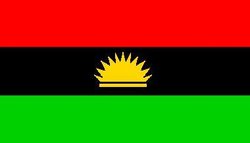Biafra
|
|
| |||
| Missing image Biafra_map.PNG Map of Biafra inside Nigeria | |||
| Languages | Igbo, English | ||
| Capital | Enugu | ||
| Head of State | Philip Effiong | ||
| National anthem | Land of the Rising Sun | ||
| Currency | Biafran Pound (BIAP) | ||
| Population;- Total | 13,500,000 (1967) | ||
| Created | May 30, 1967 | ||
| Dissolved | January 15, 1970 | ||
| Demonym | Biafran | ||
The Republic of Biafra was a short-lived secessionist state in southeastern Nigeria. It existed from May 30, 1967 to January 15, 1970, with the military's Chief of Staff formally announcing capitulation on January 12. The country was named after the Bight of Biafra, the bay of the Atlantic to its south.
It was recognised by a small number of countries during its existence, including South Africa; however South Africa's support of apartheid may have discouraged wider recognition by other African nations.
In January 1966, Ibo officers in the Nigerian army attempted a coup, which was bloody and short-lived. In the months of May and September of 1966, Ibo migrants living in northern Nigeria were the targets of mass killings. Most of Nigeria's 8 million Ibo (or Igbo) people live in what was then the Eastern Region of Nigeria, which had as military governor the Ibo Lieutenant Colonel Chukwuemeka Odumegwu Ojukwu. He declared the region an independent state with a capital at Enugu, and his troops began seizing Federal resources such as inbound postal vehicles.
Nigeria responded initially with an economic blockade, and brought military force to bear starting on July 6, 1967. In the ensuing Biafran War, raids were made by Biafran troops west into Nigeria in July and August. Nigerian troops soon recovered however, advancing into Biafra, and forcing the repeated transfer of the Biafran capital from Enugu to Aba and then Umuahia by the end of the year, and to Owerri in 1969.
By 1970, Biafra had been ravaged by war and was in great need of food supplies. Amid economic and military collapse, Ojukwu fled the country and the rest of the republic's territory was re-incorporated into Nigeria. Around a million people are thought to have died in the conflict, mostly through starvation and illness.
Biafra's national anthem used the Finlandia tune by Jean Sibelius.
This conflict inspired musician Jello Biafra in his choice of name.
Nigeria later renamed the Bight of Biafra as the Bight of Bonny.
External links
- Biafraland (http://www.biafraland.com/) - The official site of the Biafra Actualization Forum, which presents a point of view that seems close to that of the MASSOB, the Movement for the Actualization of the Sovereign State of Biafra, which is the main group currently still advocating the restoration of Biafra.da:Biafra
de:Biafra es:Biafra fr:Biafra id:Biafra nl:Biafra ja:ビアフラ共和国 pl:Biafra pt:Biafra fi:Biafra sv:Biafra


